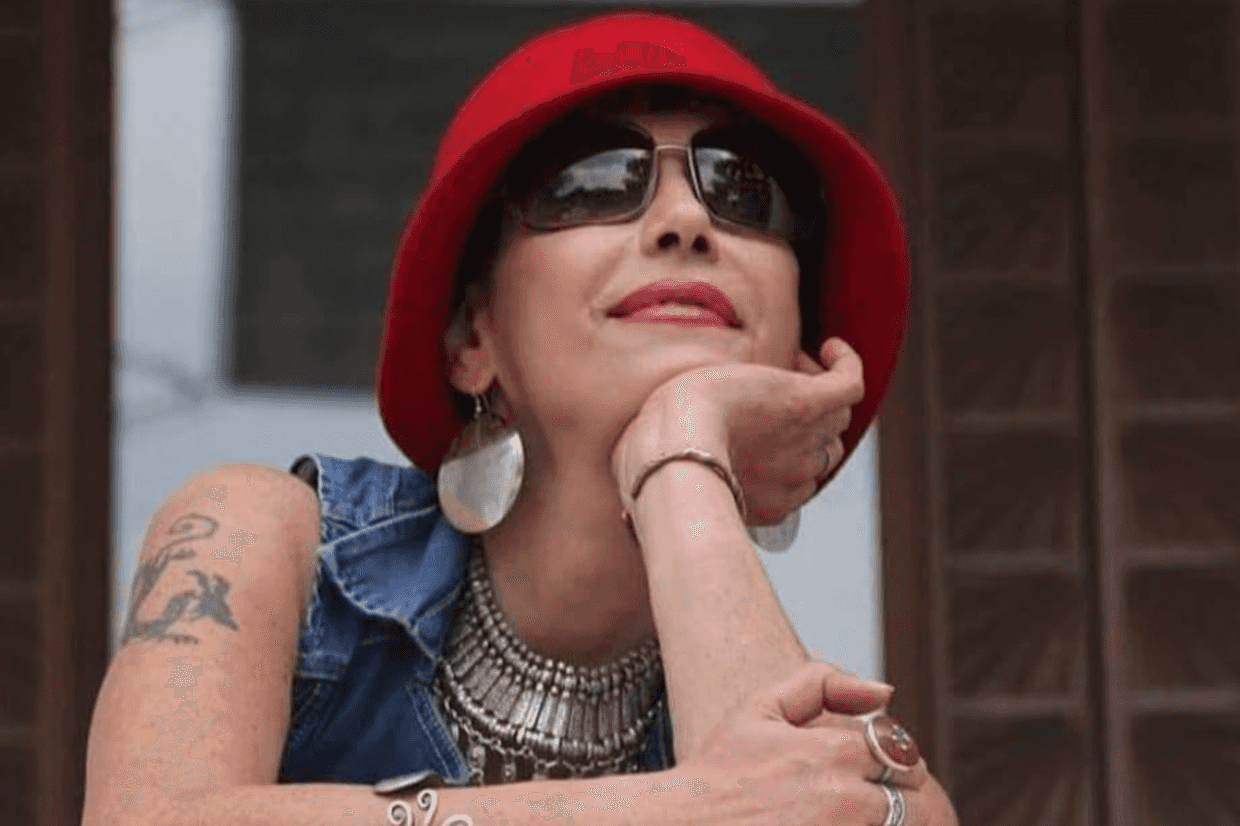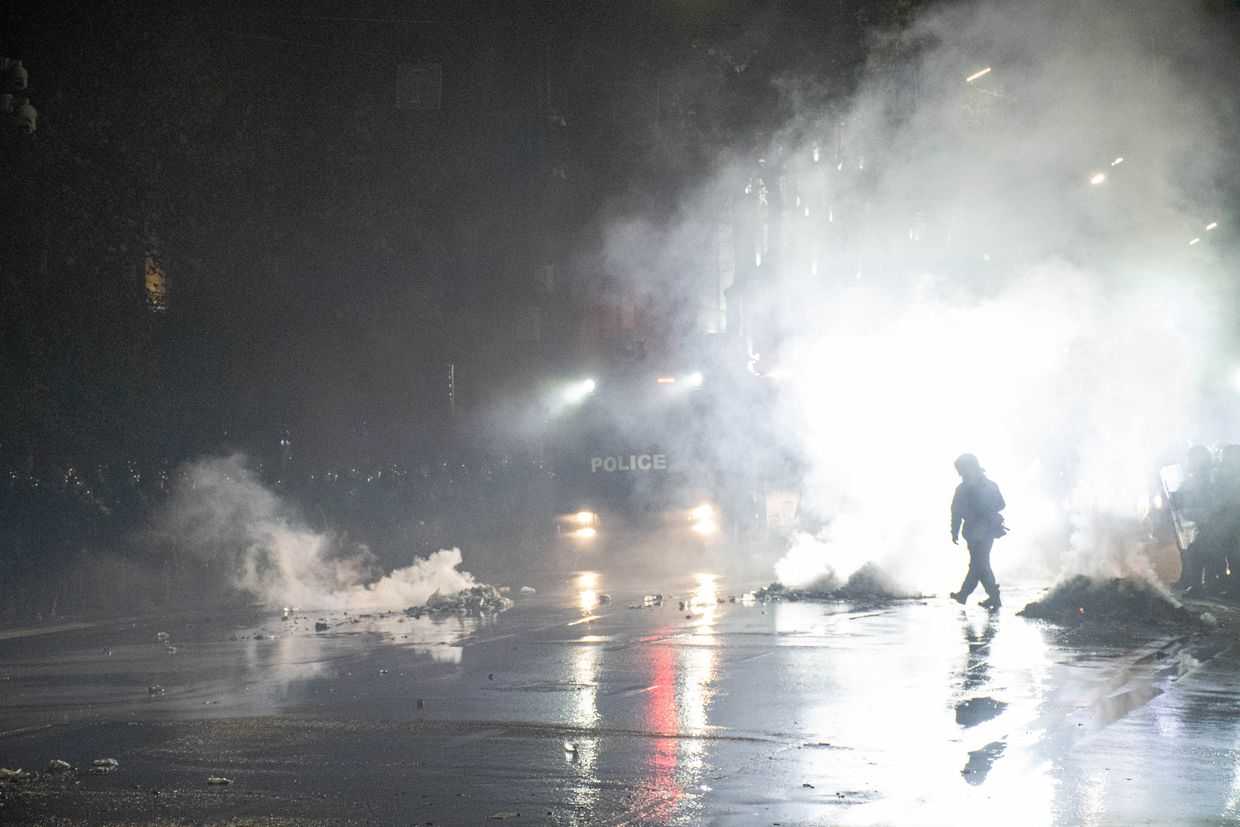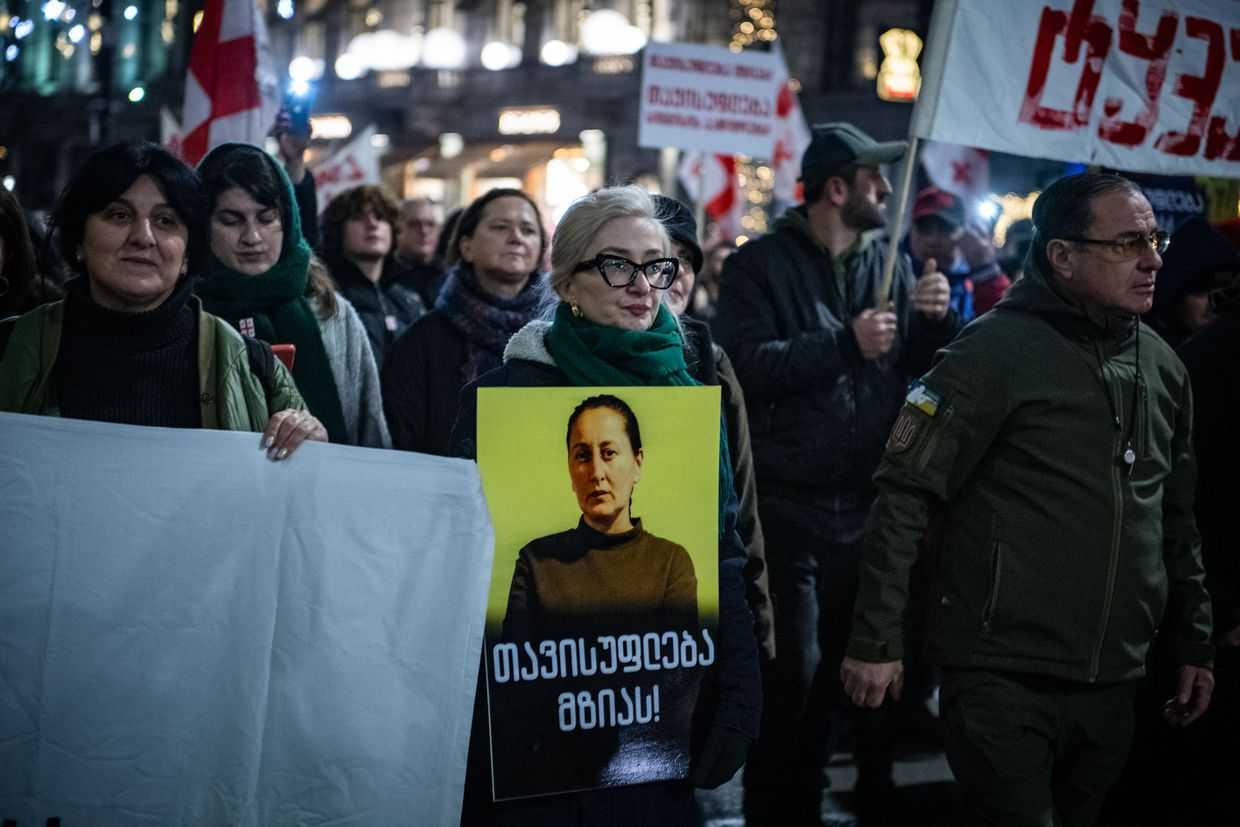Georgian foreign agent bill passes first reading in parliament amidst massive protests
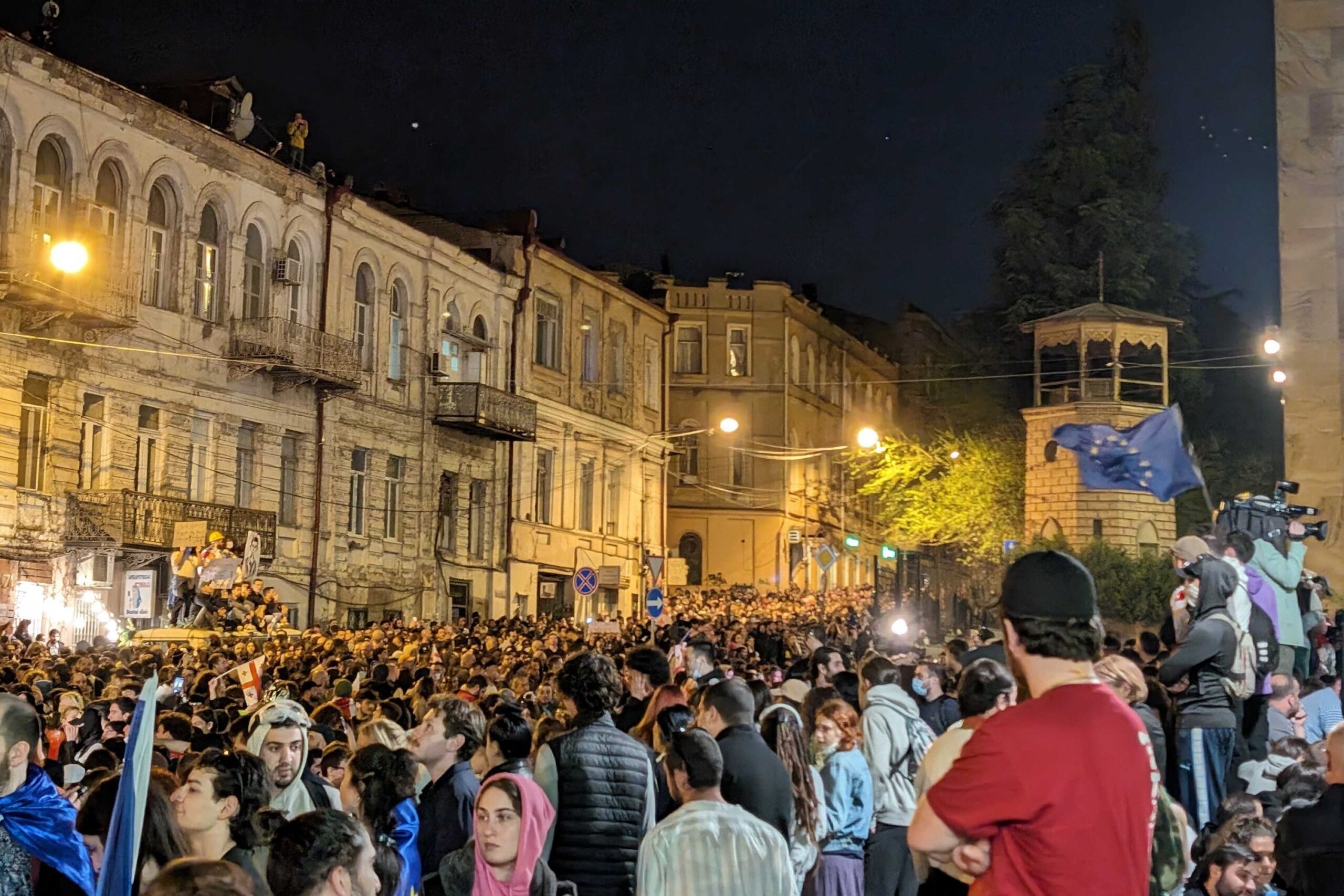
Georgia’s controversial draft foreign agent law has passed its first reading in parliament as thousands of protesters came out to the streets to oppose the law.
During Wednesday’s session, a number of opposition MPs were again ejected from parliament, while online media was barred from covering the debate.
Protesters began gathering behind the parliament early in the afternoon, growing to tens of thousands by evening — the largest since the bill was reintroduced.
Georgian Dream announced they would again attempt to pass the law in early April, a year after protesters forced the government to retract it.
The bill must now pass two more readings in parliament, and likely overcome a presidential veto before coming into effect. Parliament has yet to announce when they plan on holding the second reading.
In a lengthy press briefing following the vote in parliament, Prime Minister Irakli Kobakhidze doubled down on his support for the law, stating that Georgia was at risk of ‘Ukrainisation’. He slammed civil society groups and independent media for what he said were their ‘attacks’ on the Georgian Orthodox Church and for promoting ‘LGBT propaganda’.
He criticised the protesters against the law, who he said were protesting against Georgia’s sovereignty. He also attacked Western leaders, calling out NATO Secretary General Jens Stoltenberg and German Chancellor Olaf Scholz specifically.
He also suggested the law would help with Georgia’s ‘euro-integration’, despite widespread condemnation from the West.
As the protests were underway outside parliament on Wednesday evening, protest leaders gave the government an hour-long ultimatum to renounce the bill. After it passed, tens of thousands marched to the nearby government building, where the prime minister and other senior officials were thought to be.
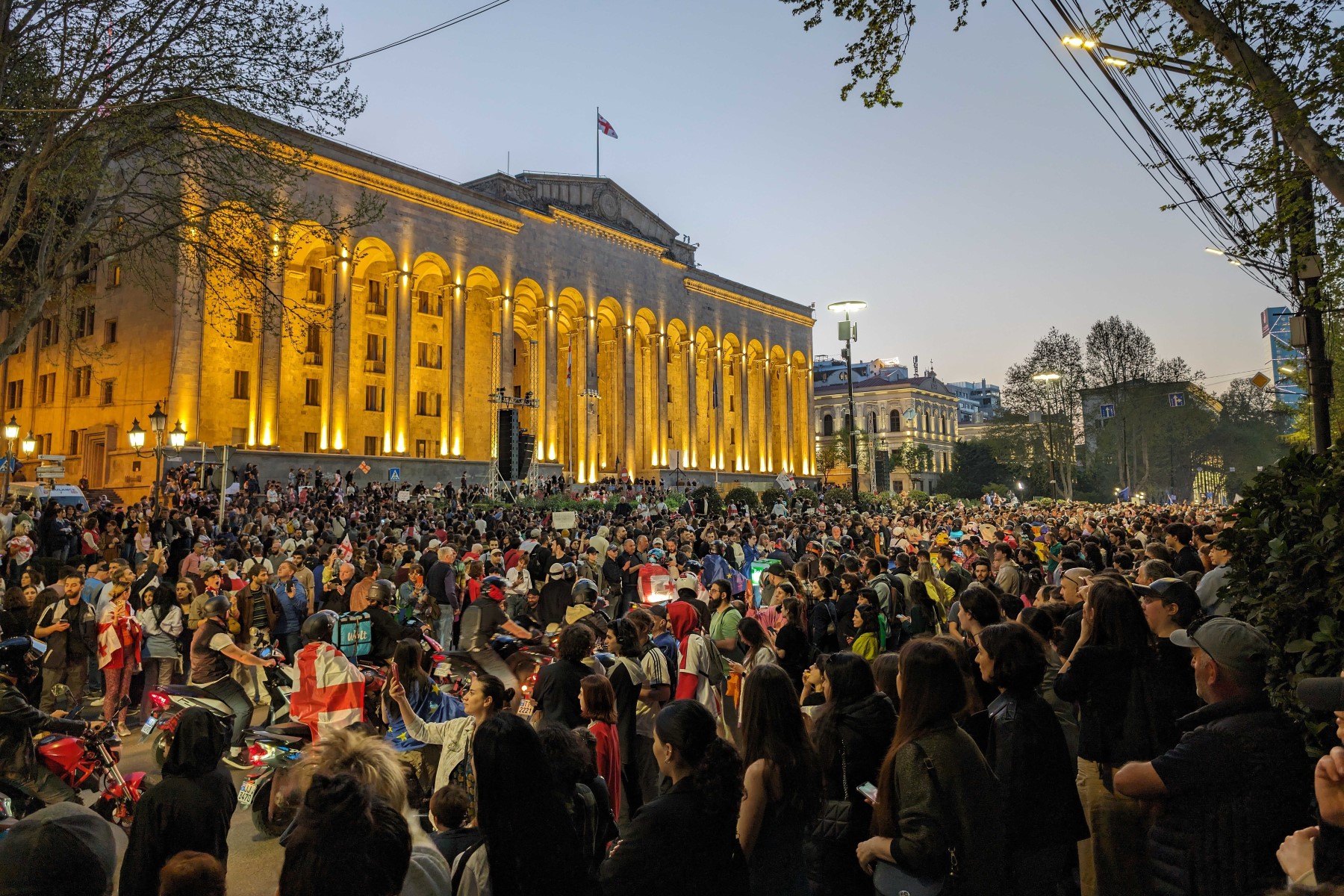
The protests remained peaceful, however, police arrested two people, one of whom they said had a weapon. Police also detained Aleko Elisashvili, the leader of the opposition Citizens Party, for several hours. Earlier this week, Elisashvili punched Georgian Dream’s parliamentary leader during committee hearings of the bill.
Georgia’s foreign agent law would label any civil society or media organisation that received at least 20% of its funding from outside Georgia ‘organisations carrying out the interests of a foreign power’. Such organisations would be subject to ‘monitoring’ by the Ministry of Justice every six months, which lawyers have warned could include forcing them to hand over internal communications and confidential sources. Organisations that do not comply would be subject to large fines.
Georgia’s nightlife and sports scenes join condemnation
Throughout Wednesday, several high-profile Georgian sportspeople made posts apparently expressing opposition to the draft law, including the former captain of Georgia’s national football team, Jaba Kankava. A number of prominent players, including Budu Zivzivadze, Giorgi Mamardashvili, Giorgi Chakvetadze, and Khvicha Kvaratskhelia also made similar posts.
The footballers have enjoyed massive popularity in recent weeks due to the team’s progression to the Euro 2024 finals.
Georgia’s first UFC champion, Ilia Topuria, and Merab Dvalishvili, who currently ranks first in the UFC bantamweight rankings, also made pro-European posts in apparent support of the protesters.
The bill also found condemnation in Tbilisi’s nightlife scene, with a number of the city’s most famous nightclubs, including Bassiani, Khidi, Mtkvarze, and Left Bank, releasing statements against the bill, and calling on people to join the protest against it.
Western condemnation continues
The foreign agent bill was met with renewed Western condemnation on Wednesday, with the EU’s High Representative for Foreign Affairs, Josep Borrell, and the EU Commissioner for Neighbourhood and Enlargement, Olivér Várhelyi, urging Georgian Dream to retract it. They described the bill as ‘not in line with EU core norms and values’.
‘The EU urges Georgia to refrain from adopting legislation that can compromise Georgia’s EU path, a path supported by the overwhelming majority of Georgian citizens’, they said in a joint statement issued soon after the bill passed its first reading in parliament.
In Washington, the State Department deputy spokesperson Vedant Patel also reiterated the US’s concern that the foreign agent bill could ‘stigmatise civil society organisations working to improve the lives of Georgian citizens and media organisations operating within Georgia’.
‘We urge the Georgian government to heed warnings that this bill is not in line with the European Union’s norms and values and would certainly negatively impact Georgia’s progress on its EU path’, said Patel.
The bill continued to receive a warmer reception in Moscow.
The law has been dubbed the ‘Russian Law’ by critics in Georgia due to its similarity to legislation used to crush civil society and independent media in Russia.
On Wednesday, Dmitry Medvedev, Russia’s former president and current deputy chair of the Russian Security Council, published an extensive post on his Telegram criticising the protests against the law in Georgia.
‘Whoever calls such actions spontaneous protests, let them be the first to throw a stone at their own mirror’, he wrote.
‘The main thing that “protesters” don’t like about the law “On Transparency of Foreign Influence”, which the Georgian parliament is trying to pass, is that it is, you see, a “Russian idea” and not a Western initiative’, he added.
Kremlin press secretary Dmitry Peskov also commented on the bill, insisting there was no ground to call it ‘Russian’ as Georgian critics do.
Peskov added that opposition to the law was an attempt to ‘provoke anti-Russian sentiments’ in Georgia that ‘probably come from outside’.
An earlier version of this article incorrectly described Kankava as the captain of Georgia’s national football team. Kankava is a former team captain.



